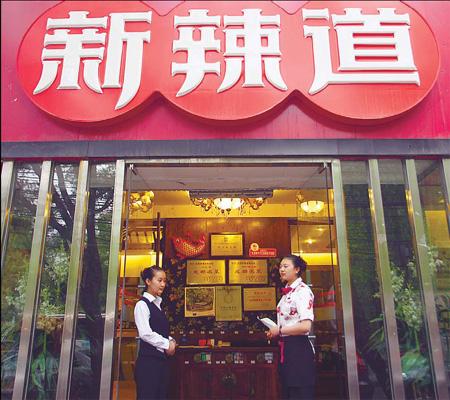
A branch store of the Spicy Way restaurant in the Chaoyang district.[ Zou Hong / China Daily]
Spicy Way impresario sees patrons taking the plunge with Sichuan fish hotpot
"Women love makeup while men love eating. I'm a man, so I got involved in the catering industry," Li Jian joked as he explained his career choice.
Li is the chairman of Beijing Xinladao F&B Management Co Ltd, best known for its Spicy Way fish hotpot, a popular restaurant chain.
All the businesses Li has tried have been related to dining: His first business was selling a street snack - malatang, meaning "hot, numb and spicy"; it's made of boiled vegetables and meat.
After that venture he sold box lunches for more than five years before selling the business and starting Spicy Way hotpot.
Earlier this month, Li opened his 15th Spicy Way restaurant in Taiyuan, Shanxi province, after 13 in Beijing and one in Chengdu, capital of Sichuan province. Li's company will open a Shanghai outlet in September.
"Compared with Chongqing Cygnet Dining Co, we are not expanding very quickly," Li said, referring to a market-leading national chain with more than 300 stores. "I want to make sure every new restaurant serves the best food; the number of chain restaurants is not the most important thing."

Fifteen years ago, when Li graduated from Linyi Normal University with a degree in Chinese literature, he was unclear about his plans.
At first, the 20-year-old graduate came to Beijing to learn English so that he eventually could go abroad.
A visit to a food stand in Weigongcun, Haidian district, changed his ideas.
"A man was selling malatang, and students and staff members working nearby were lining up to buy the food," Li recalled.
"Suddenly I wanted to try that business, too."
Learning the skills for success came easily to Li. He negotiated with the stand owner and paid 900 yuan to get the "secret recipe".
For a new graduate who hadn't started working, 900 yuan was a lot.
The investment paid off.
His food stand attracted a good crowd right from the start.
"Many customers asked whether I could prepare box lunches for them," he recalled.
Li took their advice and began serving lunches for nearby companies.
"Every day, I had to think about change because customers easily get bored with the same food," Li said.
Business was good. Through 2002 Li had catered for more than 400 companies and racked up annual sales of more than 100 million yuan.
However, the SARS epidemic struck China in 2003, and catering businesses were severely impacted as many diners shunned restaurant food. Still, he had bills to pay.
"Every day people came for the money they loaned to me to expand the business," he said.
After paying off his debt and feeling exhausted, Li sold the business and traveled.
In 2003, Li went to Sichuan province, where he discovered a delicious hotpot restaurant. Instead of boiling vegetables and meat, it boiled fish.
"It was so tasty!" Li enthused, recalling the flavorful dish.
Li also found out that fish hotpot is nutritious because it contains more protein and less fat than meat.
Believing that the fish hotpot could provide the basis for a profitable business, Li began talking to the boss, Xu Bochun, and invited him to start a business in Beijing.
"Xu is a typical Sichuan resident, who loves enjoying life and has no intention of taking a risk," Li said.
"He would rather stay in Sichuan and run his two restaurants."
Li, however, was persistent, almost stir-crazy to tap Xu's brand. He remained in Sichuan for almost a year and talked to Xu whenever possible.
After a year Xu was persuaded to sell the restaurants in Sichuan and go with Li to Beijing, where the pair opened the first Spicy Way.
"Xu is a born gourmet," Li said. "He can tell how the dish was made after eating it only once."
To make use of this talent, Li put Xu in charge of the recipes for Spicy Way fish hotpot, and sent him on "food journeys" to scout tasty victuals from across China.
"During his journey, Xu sent back local specialties," Li said. "We tried to add them to our menu."
Along the way, Li has also invented several special drinks, including an ebony tea to go with the fish.
"Every day I sell hundreds of bottles of the drink," Li said.
To maintain quality, Li insisted making Spicy Way a company-owned chain rather than a franchise restaurant.
"We even invented an automatic fish cooking machine four years ago to make sure the taste remains the same across all the stores," Li said.
Most days, all of the Spicy Ways in Beijing are packed with customers, but Li is not yet satisfied.
"My goal is to become the top brand of hotpot," Li said. "I set two goals for my company: a 'challenge one' and a 'practical one'. The challenge goal is to open 500 chain restaurants in the next five years, while the practical goal is to open 200 restaurants."





